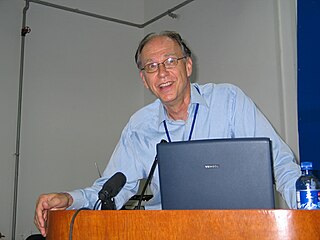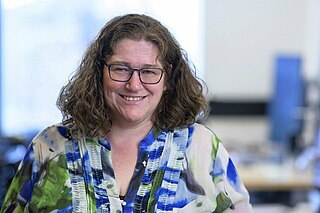
Elizabeth Helen Blackburn, is an Australian-American Nobel laureate who is the former president of the Salk Institute for Biological Studies. In 1984, Blackburn co-discovered telomerase, the enzyme that replenishes the telomere, with Carol W. Greider. For this work, she was awarded the 2009 Nobel Prize in Physiology or Medicine, sharing it with Carol W. Greider and Jack W. Szostak, becoming the first Australian woman Nobel laureate.

Michael Spencer Waterman is a Professor of Biology, Mathematics and Computer Science at the University of Southern California (USC), where he holds an Endowed Associates Chair in Biological Sciences, Mathematics and Computer Science. He previously held positions at Los Alamos National Laboratory and Idaho State University.

David Haussler is an American bioinformatician known for his work leading the team that assembled the first human genome sequence in the race to complete the Human Genome Project and subsequently for comparative genome analysis that deepens understanding the molecular function and evolution of the genome.

Eugene Wimberly "Gene" Myers, Jr. is an American computer scientist and bioinformatician, who is best known for contributing to the early development of the NCBI's BLAST tool for sequence analysis.
The ISCB Overton Prize is a computational biology prize awarded annually for outstanding accomplishment by a scientist in the early to mid stage of his or her career. Laureates have made significant contribution to the field of computational biology either through research, education, service, or a combination of the three.
The ISCB Accomplishment by a Senior Scientist Award is an annual prize awarded by the International Society for Computational Biology for contributions to the field of computational biology.
Trey Ideker is a professor of medicine and bioengineering at UC San Diego. He is the Director of the National Resource for Network Biology, the San Diego Center for Systems Biology, and the Cancer Cell Map Initiative. He uses genome-scale measurements to construct network models of cellular processes and disease.

Ron Shamir is an Israeli professor of computer science known for his work in graph theory and in computational biology. He holds the Raymond and Beverly Sackler Chair in Bioinformatics, and is the founder and former head of the Edmond J. Safra Center for Bioinformatics at Tel Aviv University.

Gary Stormo is an American geneticist and currently Joseph Erlanger Professor in the Department of Genetics and the Center for Genome Sciences and Systems Biology at Washington University School of Medicine in St Louis. He is considered one of the pioneers of bioinformatics and genomics. His research combines experimental and computational approaches in order to identify and predict regulatory sequences in DNA and RNA, and their contributions to the regulatory networks that control gene expression.

Dana Pe'er, Chair and Professor in Computational and Systems Biology Program at Sloan Kettering Institute is a researcher in computational systems biology. A Howard Hughes Medical Institute (HHMI) Investigator since 2021, she was previously a professor at Columbia Department of Biological Sciences. Pe'er's research focuses on understanding the organization, function and evolution of molecular networks, particularly how genetic variations alter the regulatory network and how these genetic variations can cause cancer.

Bonnie Anne Berger is an American mathematician and computer scientist, who works as the Simons professor of mathematics and professor of electrical engineering and computer science at the Massachusetts Institute of Technology. She is the head of the Computation and Biology group at MIT's Computer Science and Artificial Intelligence Laboratory. Her research interests are in algorithms, bioinformatics and computational molecular biology.

Anthony Rex Hunter is a British-American biologist who is a professor of biology at the Salk Institute for Biological Studies and the University of California San Diego. His research publications list his name as Tony Hunter.

Janet Kelso is a South African computational biologist and Group leader of the Minerva Research Group for Bioinformatics at the Max Planck Institute for Evolutionary Anthropology. She is best known for her work comparing DNA from previous humans with those of the present.

Carl H. June is an American immunologist and oncologist. He is currently the Richard W. Vague Professor in Immunotherapy in the Department of Pathology and Laboratory Medicine at the Perelman School of Medicine of the University of Pennsylvania. He is most well known for his research on T cell therapies for the treatment of several forms of cancers. In 2020 he was elected to the American Philosophical Society.
The ISCB Innovator Award is a computational biology prize awarded annually to leading scientists who are within two decades post-degree, who consistently make outstanding contributions to the field, and who continue to forge new directions. The prize was established by the International Society for Computational Biology (ISCB) in 2016 and is awarded at the Intelligent Systems for Molecular Biology (ISMB) conference. The inaugural recipient was Serafim Batzoglou.
ISCB Fellowship is an award granted to scientists that the International Society for Computational Biology (ISCB) judges to have made “outstanding contributions to the fields of computational biology and bioinformatics”. As of 2019, there are 76 Fellows of the ISCB including Michael Ashburner, Alex Bateman, Bonnie Berger, Steven E. Brenner, Janet Kelso, Daphne Koller, Michael Levitt, Sarah Teichmann and Shoshana Wodak. See List of Fellows of the International Society for Computational Biology for a comprehensive listing.
Katherine Snowden Pollard is the Director of the Gladstone Institute of Data Science and Biotechnology and a professor at the University of California, San Francisco (UCSF). She is a Chan Zuckerberg Biohub Investigator. She was awarded Fellowship of the International Society for Computational Biology in 2020 and the American Institute for Medical and Biological Engineering in 2021 for outstanding contributions to computational biology and bioinformatics.

M. Madan Babu is an Indian-American computational biologist and bioinformatician. He is the endowed chair in biological data science and director of the center of excellence for data-driven discovery at St. Jude Children's Research Hospital. Previously, he served as a programme leader at the MRC Laboratory of Molecular Biology (LMB).

Frances I. Lewitter is a computational biologist and the founding director of the Whitehead Institute’s Bioinformatics and Research Computing (BaRC) program.













